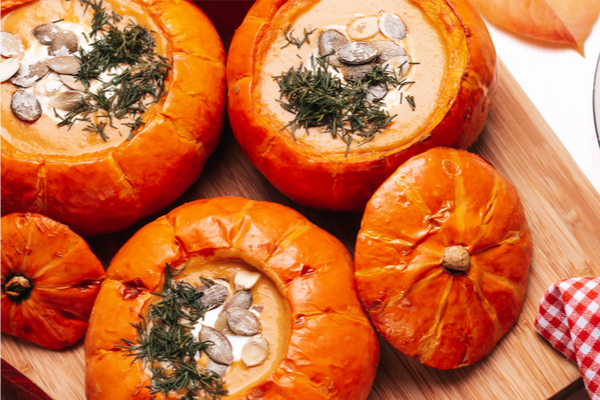Pumpkins are a huge part of American culture, so much that every year about 655,765 US tons of them are produced. Yes, our nation is obsessed with these orange globular squashes of all sizes, especially in the month of October, which just happens to be National Pumpkin Month, AND October 26th is also National Pumpkin Day.
Of course it makes sense that we should be celebrating the big orange gourds this time of year! They’re great for tossing contests, carving contests, and Halloween decorations. But are pumpkins good for your health? Pumpkins are full of vitamins and minerals, so they’re definitely good for you. But how many pumpkins really wind up in our bellies? Here are some specific reasons why they should wind up on your dinner plate more so than on your front door.
Why Are Pumpkins Good For Your Health? Here are three great reasons:
#1. Potassium:
Pumpkins contain a decent amount of potassium that helps control blood pressure and support heart health. Consuming more potassium helps your body remove the primary element that raises blood pressure, sodium. Potassium also lowers the tension in your blood vessel walls to lower blood pressure further. So, yes, these cute, funny looking Halloween decorations are also good for your health.
#2. Antioxidants:
Pumpkins are rich in powerful antioxidants, so they’re are really good for your health. In fact, pumpkin seeds are known as a “super food.” Beta-carotene alone has many benefits including lowering the risk of asthma, heart disease, certain cancers, and degenerative eye diseases. It’s even known to delay aging and body degeneration.
#3. Low Calorie/Low Fat/Low Sugar
Avoid the guilt from all the Halloween candy and Thanksgiving desserts and look to fresh pumpkin recipes instead. Some canned pumpkins are also high in the same nutrients, but fresh is typically the best way to go. Like most other plant foods, pumpkins are low in calories, fat, and sugar, so it can help lower your risk of obesity, diabetes and heart disease. Pumpkin seeds have also proven to help absorb glucose into the intestines and balance liver glucose.
—
Photo Credit: Maria Shipakina / Shutterstock.com
